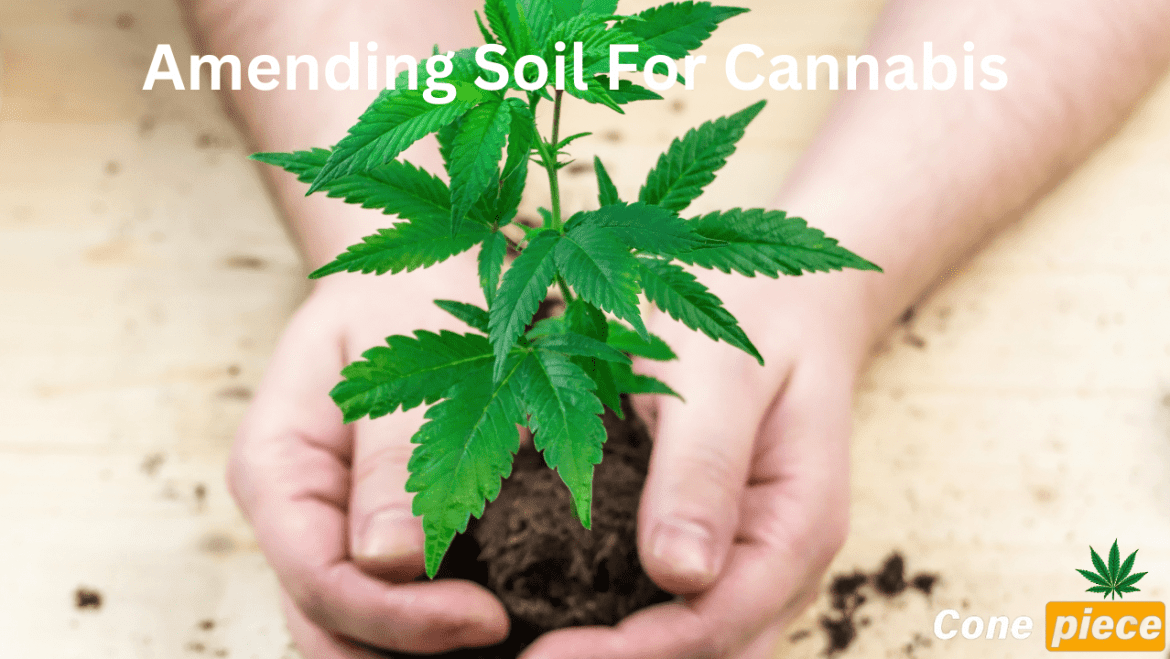Amending Soil For Cannabis: The Art of Amending Soil for Optimal Cannabis Growth: What are the best soil supplements for cannabis?
Master the art of soil amendment for cannabis cultivation. Explore expert tips on creating the perfect soil blend to boost your plant’s health and maximize yield.
The Art of Amending Soil for Optimal Cannabis Growth
In the vibrant world of cannabis cultivation, the soil is much more than just the ground your plants grow in; it’s the life source, the foundation of your plant’s health and productivity. As an expert in cannabis horticulture, I’ve learned that amending soil is a critical skill akin to a chef perfecting their recipe. Let’s explore the intricate process of soil amendment for cannabis cultivation.
Understanding Soil Composition
Before diving into amendment, it’s vital to understand soil composition. Soil is a complex combination of minerals, organic matter, water, and air. Its composition determines its texture, drainage, and nutrient content – all crucial factors for healthy cannabis growth.
The Importance of pH Balance
The different pH levels of your soil can make or break your cannabis growth. Cannabis plants prefer a slightly acidic to neutral pH, typically between 6.0 and 7.0. This range allows for optimal nutrient absorption. Testing your soil’s pH is the first step in understanding what amendments it might need.
Organic Matter: The Heart of Healthy Soil
Organic matter is the cornerstone of fertile soil. It improves soil structure, water retention, and aeration while providing essential nutrients. Compost, aged manure, and worm castings are excellent sources of organic matter, rich in the microorganisms that benefit soil health.
Amending for Drainage and Aeration
Cannabis roots need oxygen to thrive, making drainage and aeration key. Consider adding perlite, vermiculite, or sand if your soil is too dense or clayey. These amendments can lighten the soil texture, promoting better root growth and preventing waterlogging.
Nutrient Balance: The Key to Vitality
Cannabis plants are heavy feeders, requiring a perfectly balanced blend of nitrogen, phosphorus, and potassium, along with other micronutrients. Bone meal, blood meal, and kelp meal are natural amendments that can enrich the soil with these essential nutrients.
The Role of Mulch
Applying mulch on top of your soil can do wonders. It conserves moisture, regulates soil temperature, and gradually adds organic matter as it decomposes. Mulch also helps in suppressing weed growth, a constant challenge in cannabis cultivation.
Amending Over Time
Soil amendment isn’t a one-off task. It’s a continuous process, evolving with your plant’s growth stages. As your cannabis plants develop, their nutritional needs change, and so should your soil amendment strategy.
Going Beyond Nutrients
While nutrients are the stars of the soil, there’s more to consider. Incorporating beneficial fungi, like mycorrhizae, can enhance root growth and nutrient uptake. Similarly, encouraging beneficial insects and microbes can promote a more vibrant, resilient soil ecosystem.
Trial and Error: The Path to Mastery
Amending soil for cannabis is as much an art as it is a science. It often involves trial and error, observation, and adaptation. Keep records of your soil amendments and plant responses to refine your approach with each growing cycle.
What Are The Best Soil Supplements For Cannabis?
What are the best soil supplements for cannabis?
Compost:
Rich in organic matter, compost improves soil structure and water retention and provides diverse essential nutrients. It also introduces beneficial microorganisms that aid in nutrient breakdown and absorption.
Worm Castings:
These are an excellent source of nutrients and beneficial microbes. They provide a slow-release form of organic fertilizer, improving soil structure and nutrient availability.
Bone Meal:
High in phosphorus, bone meal is excellent for promoting strong root development and flowering in cannabis plants. It also contains calcium and trace elements beneficial for plant growth.
Blood Meal:
As a rich source of nitrogen, blood meal is ideal for the vegetative growth phase of cannabis. It helps build plant proteins and chlorophyll, which are essential for healthy growth.
Bat Guano:
In brief, This is another excellent organic fertilizer, providing a rich source of nitrogen, phosphorus, and potassium, along with numerous micronutrients. It can be used for both the vegetative growth and flowering stages.
Fish Meal:
Packed with nitrogen, phosphorus, and potassium, fish meal is a potent, fast-acting fertilizer that can significantly benefit cannabis plants during their growth cycle.
Dolomite Lime:
This supplement stabilises pH levels and provides calcium and magnesium, essential for plant health and robust growth.
Mycorrhizae:
This beneficial fungus forms a symbiotic relationship with cannabis roots, enhancing nutrient and water uptake and offering protection against certain root diseases.
Kelp Meal or Seaweed Extracts:
Rich in trace elements and natural growth hormones, kelp supplements support overall plant health, improve stress resistance, and encourage robust growth.
Perlite or Vermiculite:
Although not nutrients, these additives improve soil aeration and water retention, which is crucial for healthy root development.
Humic and Fulvic Acids:
These natural compounds enhance nutrient uptake, improve soil structure, and stimulate microbial life, contributing to overall plant health.
Rock Phosphate:
A natural source of phosphorus, it’s particularly beneficial for bud development during the flowering phase.
Conclusion: What are the best soil supplements for cannabis? In brief, It is a perfect combined mixture.
Is Regular Potting Soil OK For Cannabis?
Nutrient Content: Cannabis plants have particular nutrient needs, especially during flowering. Regular potting soil may not have the optimal balance of nutrients, such as nitrogen, phosphorus, and potassium, that cannabis requires. You might need to supplement with additional nutrients.
Drainage and Aeration: Cannabis roots require good drainage and aeration to prevent issues like root rot. Some potting soils are designed for common houseplants and may retain too much moisture for cannabis. Adding perlite or vermiculite can improve soil drainage and aeration.
Soil pH: Cannabis prefers a slightly acidic soil pH, typically between 6.0 and 7.0. Regular potting soil may not fall within this range, so you might need to adjust the pH accordingly.
Soil Texture: The ideal soil for cannabis is light and fluffy to allow roots to grow and expand easily. Some potting soils may be too dense or compact, which can hinder root growth.
Pest and Disease Control: Some potting soils come with added pesticides or fungicides. While these can be beneficial for preventing pests and diseases, they might not be suitable or necessary for cannabis plants.
Organic vs. Non-Organic: If you prefer to grow cannabis organically, you’ll need to ensure that your potting soil is organic and doesn’t contain synthetic fertilizers or chemicals.
In Conclusion, Amending Soil For Cannabis
In short, cannabis plant cultivation is a journey of learning and adaptation. It involves understanding your soil’s unique composition and needs and nurturing it with the right balance of nutrients, organic matter, and care. With patience, observation, and a willingness to learn, you can create a perfect growing medium for your cannabis plants, leading to a bountiful and high-quality harvest.
Have a look at our online shop – www.conepiece.com.au
All in all, we recommend this link Cannabis Vaporizer Catalogue
You can find us on Instagram at cone_piece_australia
www.conepiece.com.au



Add Comment